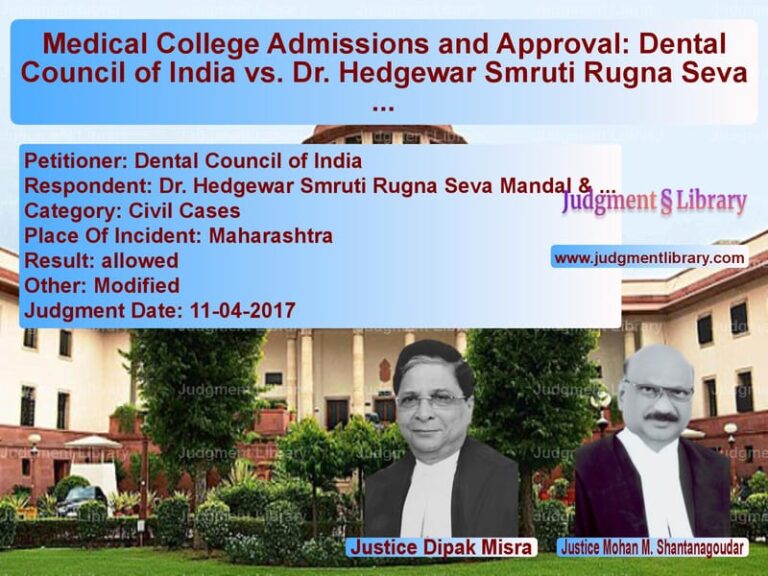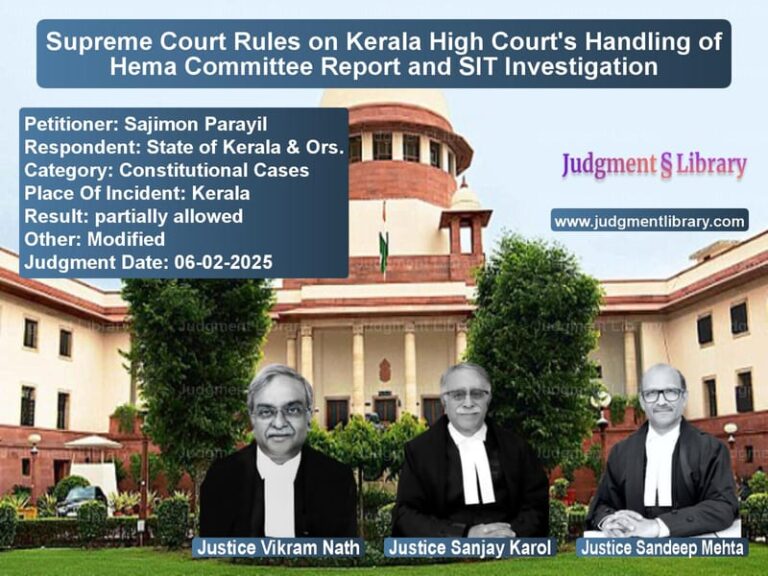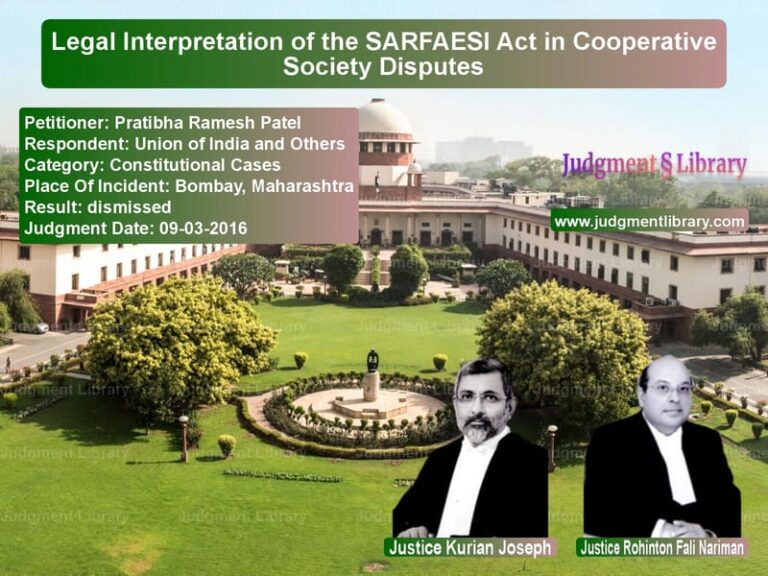Death Sentence Commuted: Supreme Court Reduces Punishment in Child Rape and Murder Case
The Supreme Court of India, in a recent judgment, commuted the death sentence of Pappu, who was convicted for the rape and murder of a seven-year-old girl. The Court modified his punishment to life imprisonment with a minimum actual imprisonment of 30 years before eligibility for remission. This case raises significant legal questions about the application of the ‘rarest of rare’ doctrine in awarding the death penalty.
Case Background
The case began with an FIR registered by the victim’s mother in Kushinagar, Uttar Pradesh. She reported that her daughter had gone missing after being seen with the appellant, who had lured her away on the pretext of plucking lychee fruits. The next day, her dead body was recovered near a riverbank, allegedly at the instance of the appellant.
Trial Court Proceedings
The trial court found the appellant guilty under:
- Section 376 (rape) IPC
- Section 302 (murder) IPC
- Section 201 (destruction of evidence) IPC
- Sections 5/6 of the Protection of Children from Sexual Offences (POCSO) Act
Considering the brutality of the crime, the trial court imposed the death penalty under Section 302 IPC and awarded imprisonment for other offenses. The trial court reasoned that the case fell under the ‘rarest of rare’ category, making the death penalty necessary.
High Court’s Confirmation of the Death Sentence
The accused appealed to the High Court, which confirmed the death sentence. The High Court observed that:
- The crime was premeditated and cruel.
- The minor victim had been subjected to sexual violence before being killed.
- The forensic evidence conclusively linked the appellant to the crime.
- The brutality of the crime warranted the harshest possible punishment.
The High Court held that the case met the criteria for the ‘rarest of rare’ category, justifying capital punishment.
Supreme Court Appeal
The appellant then approached the Supreme Court, arguing that the punishment was excessive. His counsel presented multiple mitigating factors, including:
- The appellant had no previous criminal record.
- There was no clear evidence of premeditation.
- His socio-economic background and lack of education limited his awareness of the consequences of his actions.
- Possibility of reformation and rehabilitation.
Supreme Court’s Key Observations
- The forensic evidence was sufficient to prove the appellant’s guilt beyond a reasonable doubt.
- The crime was indeed heinous and warranted the strictest punishment.
- The trial court and High Court had not adequately considered mitigating factors before awarding the death sentence.
- Judicial precedents indicate that life imprisonment should be the norm, and death penalty should be imposed only in the ‘rarest of rare’ cases.
- The Court cited its ruling in Bachan Singh v. State of Punjab (1980), which held that capital punishment must be imposed only in cases where reformation is impossible.
- The Court also referenced Macchi Singh v. State of Punjab (1983), which laid down the ‘rarest of rare’ principle.
- The Court noted that the appellant had not been previously involved in any other crimes, which indicated a potential for rehabilitation.
Key Excerpts from the Supreme Court Judgment
On the application of the ‘rarest of rare’ doctrine:
“While the crime is brutal and inexcusable, the test laid down in Bachan Singh requires a careful balancing of aggravating and mitigating factors before awarding the death penalty.”
On the possibility of reformation:
“There is no evidence to suggest that the appellant is beyond reformation. The principle of proportionality demands that life imprisonment with a fixed term be considered instead of the irreversible punishment of death.”
On judicial discretion in death penalty cases:
“Judicial discretion in capital cases must be exercised with extreme caution. The sentence of death should not be imposed mechanically without considering individual circumstances.”
Final Verdict
The Supreme Court modified the punishment as follows:
- The appellant’s death sentence was commuted to life imprisonment.
- He must serve a minimum actual imprisonment of 30 years without remission.
- The conviction under Sections 376, 302, and 201 IPC and Sections 5/6 of the POCSO Act was upheld.
- The appellant was denied any possibility of parole before completing 30 years in prison.
Conclusion: Implications of the Judgment
This ruling carries significant implications for death penalty jurisprudence in India:
- It reinforces the principle that death penalty should be imposed only in cases where the possibility of reformation is ruled out.
- The ruling clarifies the necessity of balancing aggravating and mitigating factors before awarding capital punishment.
- It strengthens judicial precedent requiring courts to consider alternatives to the death penalty wherever possible.
- The decision reaffirms India’s cautious approach to capital punishment, ensuring that only the most exceptional cases warrant the death penalty.
This case underscores the Supreme Court’s evolving stance on the death penalty, ensuring that justice is served while upholding constitutional principles of fairness and proportionality.
Petitioner Name: Pappu.Respondent Name: The State of Uttar Pradesh.Judgment By: Justice A.M. Khanwilkar, Justice Dinesh Maheshwari, Justice C.T. Ravikumar.Place Of Incident: Kushinagar, Uttar Pradesh.Judgment Date: 09-02-2022.
Don’t miss out on the full details! Download the complete judgment in PDF format below and gain valuable insights instantly!
Download Judgment: pappu-vs-the-state-of-uttar-p-supreme-court-of-india-judgment-dated-09-02-2022.pdf
Directly Download Judgment: Directly download this Judgment
See all petitions in Murder Cases
See all petitions in Rape Cases
See all petitions in Bail and Anticipatory Bail
See all petitions in Juvenile Justice
See all petitions in SC/ST Act Case
See all petitions in Judgment by A M Khanwilkar
See all petitions in Judgment by Dinesh Maheshwari
See all petitions in Judgment by C.T. Ravikumar
See all petitions in partially allowed
See all petitions in Modified
See all petitions in supreme court of India judgments February 2022
See all petitions in 2022 judgments
See all posts in Criminal Cases Category
See all allowed petitions in Criminal Cases Category
See all Dismissed petitions in Criminal Cases Category
See all partially allowed petitions in Criminal Cases Category







